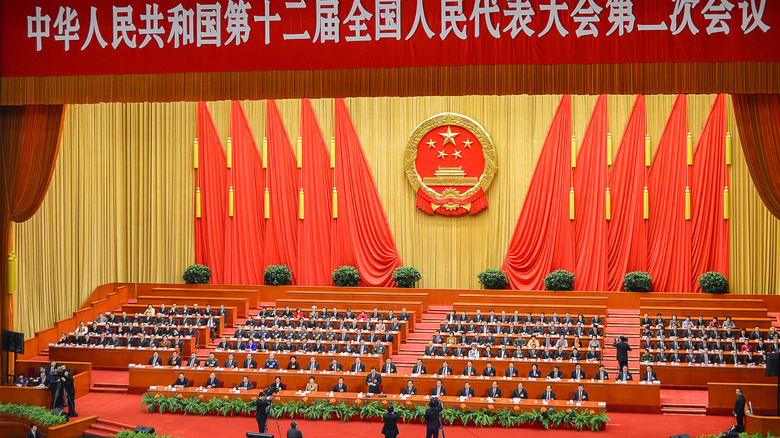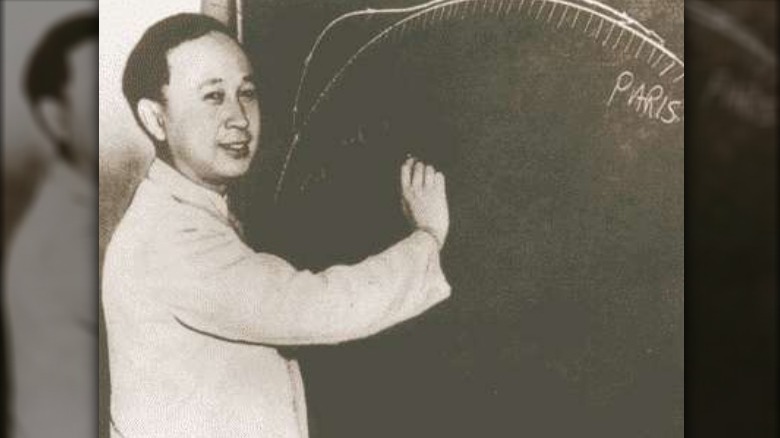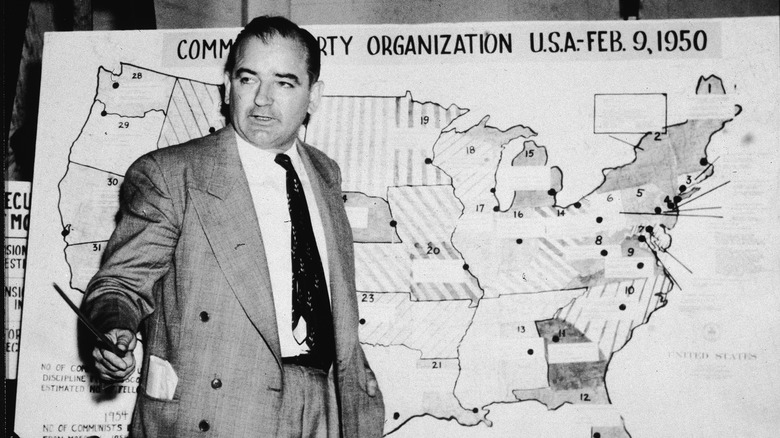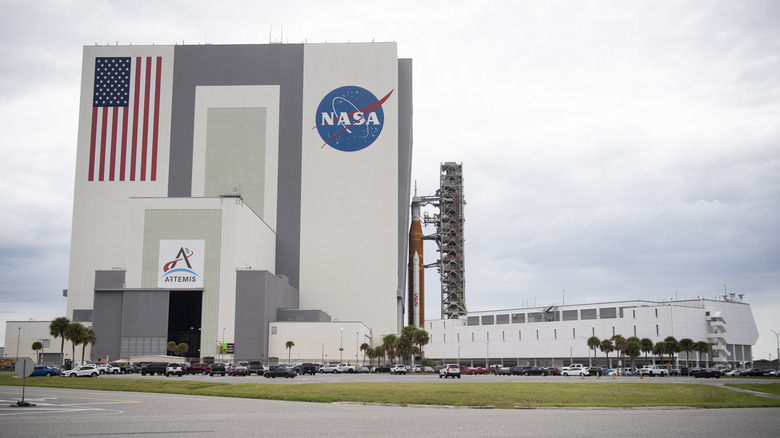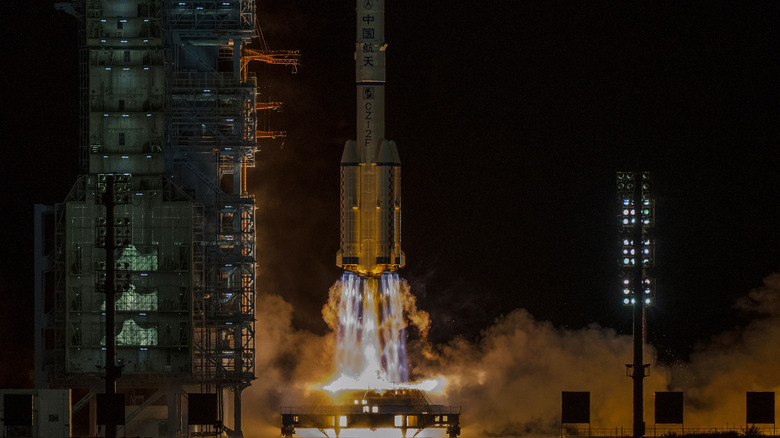How The 1950s Red Scare Led To The Creation Of China's Missile And Space Program
The 1950s were some of the most turbulent times in American history for political accusations. As Britannica says, tensions between the United States and the Soviet Union created an atmosphere of Red Scare paranoia in the U.S. Communists were suspected of being anywhere and everywhere, ready to commit political espionage against the interests of the U.S. government. This mass hysteria was helmed by Senator Joseph McCarthy, the primary architect of Red Scare politics. His influence was such that the term McCarthyism, which describes anti-communist hysteria, was named after his endless onslaught on Soviet sympathizers, whether real or imagined.
Around the same time, countries like the United States, the Soviet Union, Germany, and China were experimenting with rocket technology and aerospace advancements. As BBC explains, this wasn't always the case, as rocket science wasn't taken too seriously as a study until World War II started. From then onward, competing countries raced to develop the latest rocket technology for use in defense and space travel. And one Chinese man named Qian Xuesen was profoundly influential in developing the American and Chinese rocket industries.
Who was Qian Xuesen?
To put it simply, Qian Xuesen was arguably China's most important scientist in regard to space and rocket programs. The father of China's space industry was born on December 11, 1911, in Hangzhou, China, into aristocracy, with a lineage that was thousands of years old. As Britannica explains, both of his parents were well-educated and wealthy, which allowed him a fruitful education in his youth. Qian won a number of prestigious spots at some of the best science and engineering colleges in China at the time, but a collapsing Chinese government and economy eventually led him to study in America after having studied at Shanghai Jiao Tong University. He got an aeronautics doctorate in 1939 at Caltech and was one of the leading experts on jet technology and aerodynamics.
Qian eventually helped the U.S. government develop its own rocket program in the 1940s, which was instrumental to the space race (via BBC). However, Qian wasn't always wanted in the U.S., as the 1940s and 1950s were a turbulent time for anti-communist paranoia. Qian, not being shy in displaying his affection for communist China, was eventually detained for potential espionage charges in 1950. He was released back to his home country after a prisoner exchange between China and the U.S.
What was the Red Scare and McCarthyism?
Knowing the Red Scare and its historical context is key to understanding why Qian was detained and deported by the United States. As Britannica explains, McCarthyism, named after senator Joseph McCarthy, is the name for the anti-communist period between 1950 and 1954 when politicians, actors, activists, and other people of interest were subjected to investigations of alleged communist sympathizing. McCarthy first rose to power after his successful 1946 senate election, then capitalized on his political status by accusing the State Department and the CIA itself of harboring communists. Despite the fact that he never made a convincing case against any of his victims nor presented substantial evidence, various people had their careers torn apart and their lives ruined over his allegations.
Anti-communist sentiments had existed before McCarthy, however. As History says, the idea goes back to 1917, when communist paranoia gained traction as Russia was transitioning to Bolshevik leadership under Vladimir Lenin. The idea did not die out in the 1950s, however, as the legacy of the Red Scare and McCarthyism still lives on to this day. Former President Donald Trump evoked anti-communist sentiments during his campaign and presidency (via NPR). What may seem like silly far-right fearmongering today was a very real threat to the livelihoods of people decades ago.
Qian Xuesen's contributions to America's aerospace program were staggeringly important
After World War II, there was a scramble from various countries like the United States to procure Nazi rocket scientists and engineers. Smithsonian Magazine explains that German rocketry and technology secrets were in high demand, and the U.S sought to gain every technological advantage it could in wartime, even if it came from an enemy like Nazi Germany. Operation Paperclip was the official name for this joint scientific collaboration between American and Nazi science.
Qian Xuesen was part of this operation to interview and investigate German rocket tech from the experts themselves, such as Wernher von Braun, one of the most important German rocket scientists at the time (via BBC). The developments of both Qian and Theodore von Karman, a fellow aerospace engineer, formed the backdrop of America's bourgeoning aerospace industry. As Nature says, the two led the Suicide Squad, an experimental group of rocket engineers doing dangerous work at the time, and eventually led to advancements like jet-assisted take-off technology and more.
Qian Xuesen was detained and deported amid anti-communist allegations
Today, it is somewhat common knowledge in the aerospace community that Qian Xuesen was important in America's space program development. However, the man himself was treated poorly by the same government he worked for and is still a relatively obscure figure not well-known to the general American populace. As BBC says, Qian loved living in America. He had planned to live there for many more years, as he was undergoing the process of obtaining full U.S. citizenship. This all came to a crashing halt, however, when communist allegations sprung up against him.
Qian was detained and put under house arrest in 1950 after being accused of communist sympathizing and espionage. According to documentation, Qian had allegedly attended a Pasadena Communist Party meeting in 1938. Qian's interests in this meeting seemed to be based on activism, wanting to join anti-racism efforts with the group to fight back against local segregation. Despite the fact that there was no evidence of espionage, Qian would eventually be deported back to China after five years of house arrest (via Yahoo).
His deportation led to China's space and rocket programs
Qian Xuesen's deportation became a black mark in U.S. science history. What should have been a celebrated figure had become an admonished and ridiculed person in ways that celebrated Nazi scientists weren't subject to. As BBC explains, when Qian came back to China, he was celebrated as a national hero and monumental figure in the science community. Most importantly, however, Qian was able to take his research and findings from his time in America and apply them to Chinese aerospace programs.
Qian was a leading scientist in China's rocket science industry and was an important figure in helping to launch China's first space satellites. As The New York Times says, Qian is well-known today as the unanimous father of Chinese space travel. He took China's rocket industry from a primitive state to one of the most advanced in the world. He was so important that there's even an entire museum dedicated to his legacy called the Qian Xuesen Library & Museum. Qian may not have had the best time in America, but at least there was a somewhat happy conclusion to his story.
